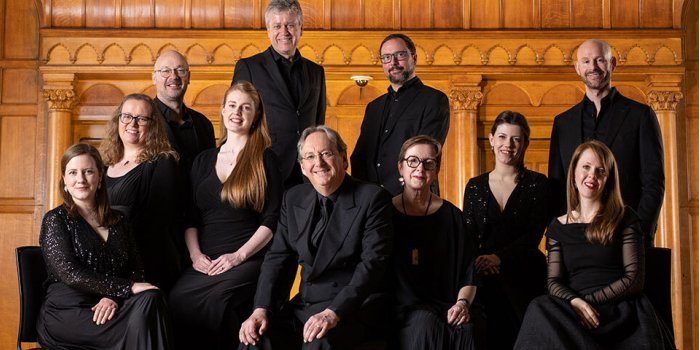
Early Music Vancouver’s final concert in its Luminescence series featured internationally acclaimed The Tallis Scholars. Titled Darkness to Light, this was the unique a capella ensemble’s 13th Vancouver concert, and they were welcomed the minute they stepped onto the stage with tumultuous applause.
The four sopranos, two altos, two tenors and two basses, led by director and founder Peter Phillips, immediately proceeded to justify that tumultuous applause. Their exquisite rendition of Lamentations, composed by Robert White during the reign of Queen Elizabeth I in the 16th Century, was the result of Phillips’s extensive research into the polyphonic style of vocal music that simultaneously combines a number of parts, each forming an individual melody while harmonizing with the others. In one lament, the bass voice led with one part and was joined by the tenors, then the altos, then sopranos. In others, one of the sopranos might lead, or the altos or a tenor. According to the programme notes, in the Tudor Queen’s day, White’s devotional music was more likely to be played in private homes, but last Sunday, it resonated throughout the entire Chan Centre for the Performing Arts.
A more modern example of polyphony was sun-centered written by David Lang. It was commissioned by The Tallis Scholars, who first performed it two years ago. Born in the US in 1957, Lang breaks down existing texts and recombines the fragments within a musical framework. His texts are written, e.e.cummings style, in lowercase without punctuation. There are five parts to sun-centered. The most stunning, part III: hymn to the sun, celebrates the sunrise with heavenly chords from the sopranos punctuating the text sung by the male and alto voices. The other highlight, part V: and yet it moves, focuses on the sunset. It is slower and deeper but equally beautiful. Parts I, II and IV are led by different individual voices and are powerfully textured by the rest, singing provocative lines such as “we find it hard to believe anything that goes against the dogmas we have learned.” The sum of the five parts is a breathtaking experience, both musically and poetically, in perfect balance.
The programme’s second half included more traditional, sacred Renaissance music by Robert Parsons and William Byrd, who mainly wrote in the 1500s. Even those composed by Eric Whitacre and Nico Muhly in the 1970s and 80s were more formal.
The many enjoyable elements of this performance by The Tallis Scholars, from their harmonies, synergy, apparent effortlessness and immaculate appearance to the synchronized turning of the pages of their pristine sheet music, created a kind of musical ballet and earned an encore furnished by Franco-Flemish composer Jean Mouton. When receiving applause, the maxim All for one and one for all still applied as Peter Phillips humbly joined the end of the line-up of singers to bow together as one.
Early Music Vancouver’s extensive 2024/25 season of single concerts opens with its annual fundraising gala on July 25 at VanDusen Botanical Gardens. Information is available at earlymusic.bc.ca.